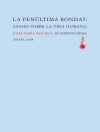Why broach and challenge the question of neutrality? For some urgent reasons. The neuter is generally considered to be the condition of objectivity. However, historically, this is asserted by a subject which is masculine and not neuter. Claiming that truth and the way of reaching it are and must be in the neuter amounts to a misuse of power and a falsification of the real. Living beings are not naturally neuter; they are sexuate somehow or other. Subjecting them to the neuter as a condition of their objective status transforms living beings into cultural products deprived of their own origin and dynamism, and builds a world in which the development and the sharing of life are impossible.
In this book, four contributors explore this basic mistake of our culture starting from the work of Heidegger and his insistence on maintaining that our being in the world – our Dasein – must be in the neuter. They question the nature of the truth which is then at stake and the political mistakes that it can cause.
It is not here a question of sexuality strictly speaking nor of sexual choice. The concern of the two men and the two women who participate in this volume is with the sexuate determination of all living beings. Is not Heidegger’s Dasein, as neutered and supposedly neutral, a kind of technical device which prevents living beings from entering into presence? If so, where might that ultimately lead?
สารบัญ
Introduction: Heidegger as an Exemplary Case.- The Destitution of Dasein.- Against Neut(e)rality.- Heidegger Without Limits.- The Appropriation of Being.- By Way of Epilogue: The Historical Task of Thinking.
เกี่ยวกับผู้แต่ง
Luce Irigaray is a retired director of research in philosophy at the Centre National de la Recherche Scientifique (C.N.R.S.), Paris. She has doctorates in philosophy (1974), in linguistics (1968) and in philosophy and literature (1955). She is also trained in psychoanalysis and in yoga. She is a regular reader of the work of Heidegger, to whom she has devoted a book L’ oubli de l’air (1983, translated as The Forgetting of Air, 1999) and to whom she refers in many of her publications.












